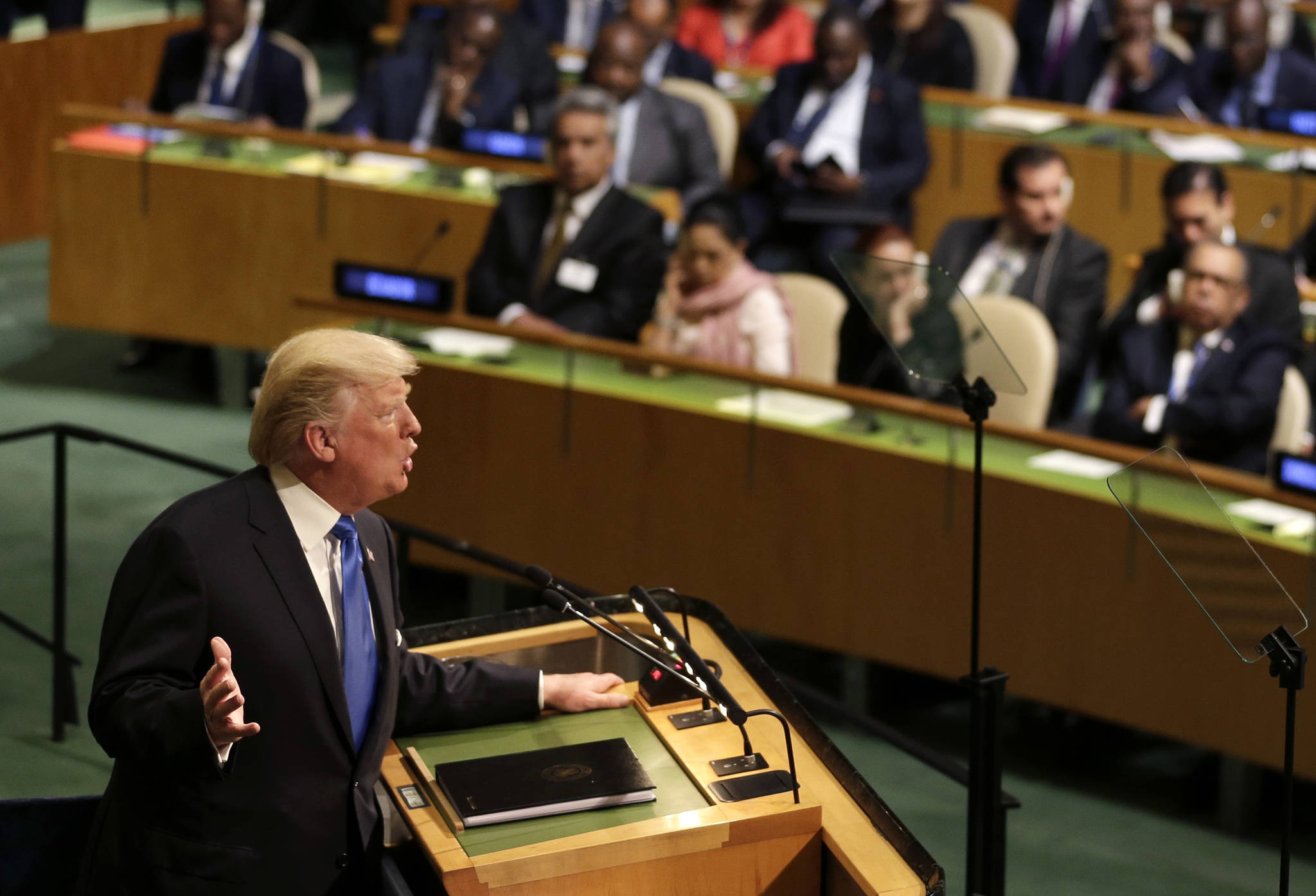By JOSH LEDERMAN
Associated Press
UNITED NATIONS — President Donald Trump invited the question, and now the world must answer: If America insists on putting itself first, will anyone else follow?
Trump scolded and badgered in his United Nations debut. He declared parts of the planet are “going to hell.” Standing Tuesday before the iconic, green marbled General Assembly backdrop, he painted a grim picture of the globe as he sees it: teeming with crisis and conflict, delinquents and deadbeats.
Yet where most leaders use the occasion to call for cooperation, Trump insisted others should follow his example and “always put your countries first.”
“As long as I hold this office, I will defend America’s interest above all else,” Trump said at the General Assembly, where nations come to advance their collective interests.
Nine months into his presidency, world leaders have grown accustomed to a new U.S. leader who eschews typical self-restraint in what he says and does. His most startling tweets, sometimes seeming to declare dramatic shifts in policy, are increasingly taken with a grain of salt.
After all, once the bombast of the moment ends, it often turns out America’s underlying policy hasn’t changed. The U.S. under Trump hasn’t withdrawn from NAFTA, hasn’t abandoned NATO, hasn’t started a trade war with China or scuttled the Iran nuclear deal.
At least not yet.
Still, Trump’s words carried an added weight, coming in his first address to the U.N. Here, leaders usually try to project an aspirational message about prospects for peace and prosperity, if only nations could work together. Trump’s address was more about naming and shaming transgressors.
He threatened to “totally destroy North Korea,” raising the specter of cataclysmic war. In the next breath, he turned to name-calling, dubbing North Korean leader Kim Jong Un a “Rocket Man (who) is on a suicide mission for himself and for his regime.”
In the assembly’s stately chambers, there were audible gasps.
It was a stunning threat from the front man for the world’s club of “responsible” nations. In recent memory, only pariah leaders like Libya’s Moammar Gadhafi and Venezuela’s Hugo Chavez have unleashed such incendiary remarks at the United Nations lectern.
“This was a speech at the wrong time to the wrong audience,” said Swedish Foreign Affairs Minister Margot Wallstrom.
Yet frustration with the U.N. is a bipartisan pastime in the U.S., and even some traditional Trump critics found the “real talk” refreshing. Former Republican presidential nominee Mitt Romney on Twitter called it a “strong and needed challenge to UN members to live up to its charter and to confront global challenges.”
Peppered throughout Trump’s speech were 21 references to “sovereignty,” the notion that countries have the right to do what is best for themselves, unencumbered by obligations from the outside. Trump said America didn’t expect others to share its traditions or “even systems of government,” an unsubtle reminder that democracy promotion is no longer the U.S. priority.
“We do not seek to impose our way of life on anyone, but rather to let it shine as an example for everyone to watch,” Trump said.
Yet nations would be mistaken to assume Washington no longer carries a long list of demands. It does.
Trump persistently chided foreign leaders for doing too little to fight terrorism, to cut off North Korea financially, to share the weight of global leadership. Painting his audience as freeloaders of the global system, he said the U.S. “bears an unfair cost burden” supporting the same U.N. agencies whose worth he has previously mocked.
It’s that incongruity — between browbeating others to do more, and insisting everyone look out for themselves — that has perplexed nations struggling to decide how best to deal with the new American leader.
“In many ways, the speech was a continuation of his domestic ‘America First’ message,” said Douglas Brinkley, a presidential historian at Rice University. “But he seems to like to punish people, to frighten people, to be a catalyst of chaos. If he doesn’t create the chaos he wants, he wants at least to be on the record saying, ‘I told you that would happen.’”
On the January day he became the world’s most powerful leader, Trump stood at the Capitol and warned of “American carnage” ripping the nation apart. It was an ominous prelude to a new era that has rattled many Americans and plenty a foreign leader, but also given new hope to the Trump voters who felt abandoned in a globalized, high-tech world.
On Tuesday, he broadened his critique far beyond U.S. borders, warning the world faced the likely prospect of falling “into a valley of disrepair.” He cast North Korea, Iran, and Syria as a trio of global scoundrels, a world view that carried echoes of former President George W. Bush’s “axis of evil.”
But unlike Bush, Trump didn’t emphasize that he was choosing battles for the greater good of mankind. Instead, he made sure no one would forget whose bidding he was doing: the voters who sent him to the White House.
“I was elected not to take power,” Trump said, “but to give power to the American people, where it belongs.”
Josh Lederman has covered the White House, foreign policy and national security for the AP since 2012.

